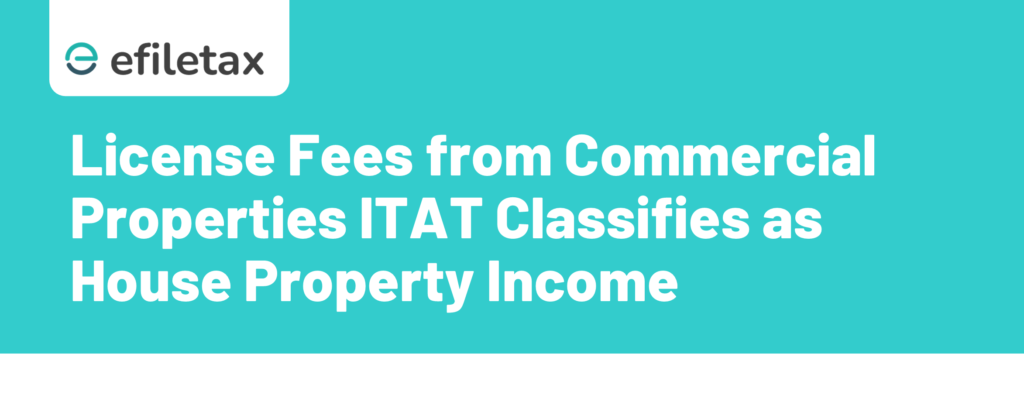
License Fees from Commercial Spaces: House Property or Business Income?
In a recent ruling dated May 12, 2025, the Income Tax Appellate Tribunal (ITAT) reinforced a key principle: license fees from commercial spaces like small offices and warehouses may be taxed under “Income from House Property” if consistently treated that way in past years. The case also involved a procedural lapse—rendering a Section 143(2) notice invalid, and thus, nullifying the entire assessment.
This decision clarifies the taxability of passive rental-like incomes from commercial spaces and reminds taxpayers of the importance of procedural compliance by tax authorities.
Why the Classification Matters: House Property vs. Business Income
License fees can be taxed under two heads:
- Business Income, if the letting is part of a commercial activity (e.g., running a hotel or warehouse service business).
In this case, ITAT sided with the “house property” classification.
Implications:
| Criteria | House Property Income | Business Income |
|---|---|---|
| Taxable under | Section 22 | Section 28 |
| Standard deduction | 30% under Section 24(a) | Only actual expenses allowed |
| Depreciation benefit | Not available | Available if part of business |
| Annual Value basis | Yes | No |
| Carry forward of losses | Allowed for 8 years | Unlimited, subject to conditions |
What the ITAT Ruled
✅ Held in Favour of the Assessee
- Addition to total income deleted.
❌ 143(2) Notice Declared Invalid
- The notice under Section 143(2) (used to initiate scrutiny) did not comply with CBDT procedural instructions.
- This procedural lapse invalidated the entire assessment, setting an important precedent.
Legal Reference:
- Section 143(2), Income-tax Act, 1961: Requires issuance of valid scrutiny notice within prescribed time, as per CBDT norms.
- Case law upholds consistency in classification, citing Supreme Court observations in Radhasoami Satsang v. CIT.
Expert Insight: What Taxpayers Should Learn
Sustained classification matters.
If you’ve been declaring rental income as “house property” for years, a sudden reclassification by the AO as “business income” must have strong grounds.
Procedural errors can be fatal for assessments.
Even a small procedural lapse—like failure to follow CBDT’s notice format or timeline—can invalidate an entire assessment.
“This case reminds us that taxation isn’t just about substance but also procedure. The CBDT’s procedural rules are not optional checkboxes—they’re legally binding.”
Practical Takeaways for Taxpayers
- ✅ Maintain consistent income classification each year, unless your activity genuinely changes.
- ✅ Retain records of previous assessments, including AO treatment of such income.
- ✅ Ensure timely scrutiny notices issued to you follow the CBDT’s exact format and time limits.
- ✅ Consult a tax expert if the AO seeks to reclassify income suddenly.
FAQ: License Fees from Commercial Units
Q1. Is license fee the same as rent?
A: Not exactly. License fees are paid for right-to-use, often short-term. But for tax purposes, they may still qualify as house property income if the owner has no active involvement.
Q2. Can income classification be changed by the AO?
A: Only with valid justification. Past consistent classification strengthens the taxpayer’s case.
Q3. What happens if a 143(2) notice is invalid?
A: If the notice is procedurally flawed, the entire assessment may be deemed void.
Conclusion
This May 2025 ITAT ruling is a significant win for small business owners and real estate investors. It confirms that license fees from commercial spaces can be taxed under “House Property Income” if there’s no active business use—and stresses the legality of procedural compliance in assessment processes.
Summary
ITAT ruled that license fees from commercial spaces should be taxed as house property income, not business income, citing consistency across past assessments. It also declared the 143(2) notice invalid for procedural lapses, voiding the entire assessment.